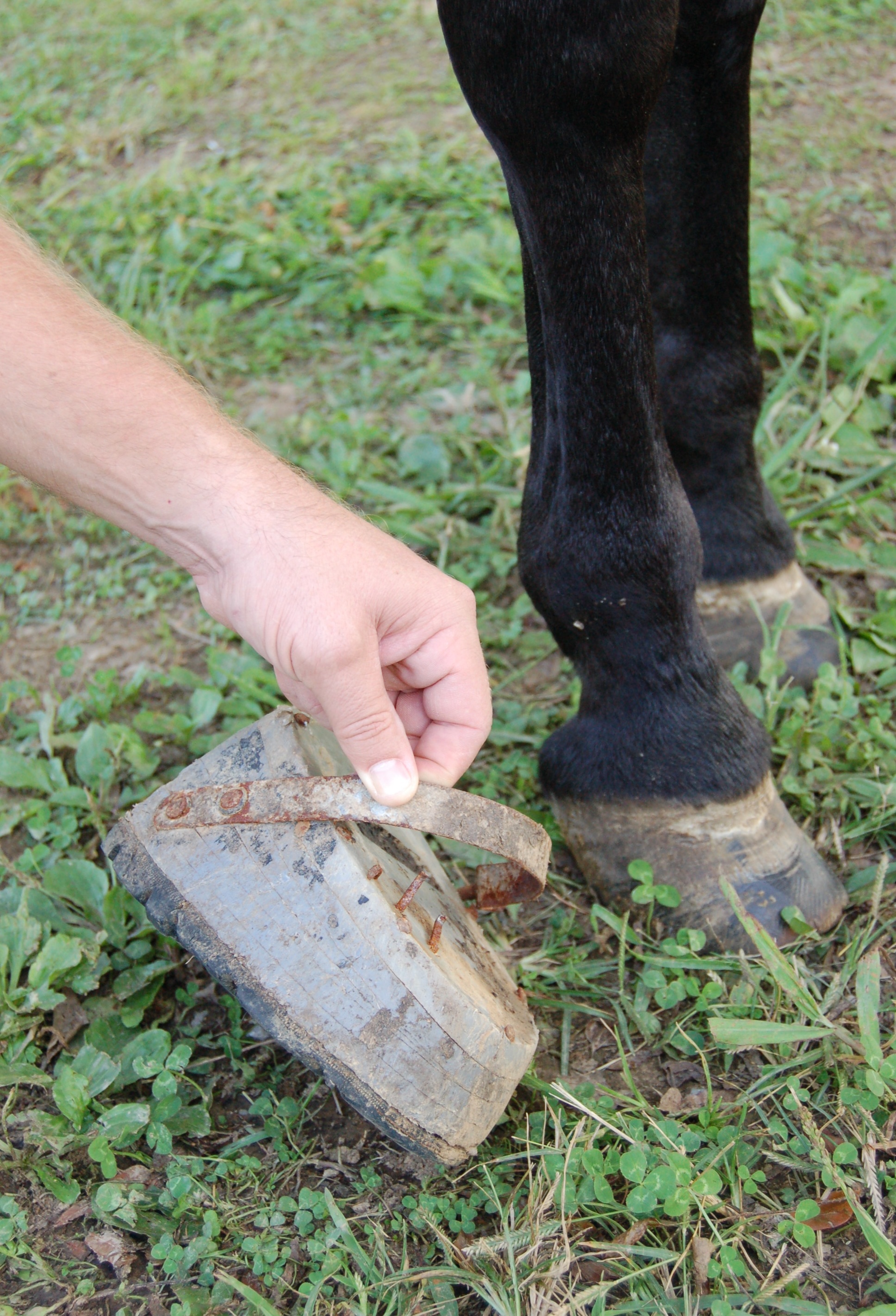Bipartisan legislation that promises to end the inhumane practice of horse soring - which became illegal in 1970 but persists due to loopholes in the current law - has garnered enough support to receive a vote in the U.S. House on Wednesday.
Bill supporters, however, fear continued opposition from Tennessee congressional leaders.
Soring is when humans intentionally injure horses' hooves or legs to make them step higher, creating an exaggerated gate known as the "big lick." It's mainly practiced on Tennessee walking horses and similar breeds with naturally lofty gaits in order to win judges' favor at competitions. Alabama's state horse, the racking horse, also is a common victim of soring.
Wednesday's vote on the "Prevent All Soring Tactics (PAST) Act" marks the first time Congress has moved to strengthen laws against soring since the practice was first banned. But while animal wellness advocates celebrate their big step forward, many worry the bill's 345 co-sponsors across both chambers won't be enough to overcome Senate opposition from the heart of "big lick" country.
"The Tennessee and Kentucky senators ... remain an obstacle, but we are hopeful that our cosponsor list and vote in the House will demonstrate just how widely and overwhelmingly supported the bill is, and we can use that momentum in the Senate where the bill already has 41 bipartisan supporters," reads a Tuesday email from Larkin Parker, a spokesperson for U.S. Rep. Kurt Schrader, D-Ore.
 A pad, which comes in different sizes, is attached the front hooves of a Tennessee Walking Horse which makes the horse lifts it's legs higher and is considered as a method of pressure shoding. Pressure-shod ia a method of soring horse's front hooves to exaggerate the animal's gait. / Staff photo by Mark Gilliland
A pad, which comes in different sizes, is attached the front hooves of a Tennessee Walking Horse which makes the horse lifts it's legs higher and is considered as a method of pressure shoding. Pressure-shod ia a method of soring horse's front hooves to exaggerate the animal's gait. / Staff photo by Mark GillilandSchrader co-sponsors the PAST Act along with U.S. Rep. Ted Yoho, R-Fla. The two are veterinarians of more than 30 years and co-chairmen of the Congressional Veterinary Medicine Caucus. A corresponding version in the Senate is sponsored by U.S. Sens. Mike Crapo, R-Idaho, and Mark Warner, R-Virginia.
The PAST Act would increase penalties for abusers and revamp the inspection process.
Currently, walking horses competing at recognized shows are checked for evidence of soring, but those inspections are handled by numerous private entities called "horse industry organizations." Conflicts of interest have rendered these inspectors ineffective, advocates say. The largest horse show for the Tennessee walking horse breed - the Celebration in Shelbyville, Tennessee - has its own horse industry organization.
The bill also would ban the use of soring devices, including the large, stacked shoes and ankle chains.
The PAST Act was introduced in 2013 but failed to receive a vote in the House because U.S. Sen. Marsha Blackburn, R-Tenn., consistently blocked the vote in her former role as vice chairwoman of the House Energy and Commerce Committee, according to animal wellness advocate Marty Irby.
In May, U.S. Sens. Lamar Alexander and Blackburn, both Tennessee Republicans, introduced their own opposition legislation to end soring: the Horse Protections Amendments Act of 2019, which mirrors a House bill introduced by U.S. Rep. Scott DesJarlais, R-Tenn., and supported by U.S. Rep. Chuck Fleischmann, R-Tenn. They say it will better protect Tennessee walking horses and the breed's tradition.
"While we all understand the importance of protecting horses, I encourage my colleagues on both sides of the aisle to reconsider moving the PAST Act to the floor until we have had time to hold a hearing or markup of the bill. This issue is too sensitive to haphazardly rush the process," reads an emailed statement by Fleischmann.
Both bills would beef up inspections and penalties for soring, as well as eliminate the multiple horse industry organizations.
Alexander and Blackburn's bill would create one horse industry organization, governed by a board, to oversee inspections. The board would be comprised of appointees by the states of Tennessee and Kentucky, as well as industry experts.
Proponents of the PAST Act say that method is problematic, because it doesn't eliminate the problem of self-policing or address stacked shoes and chains.
The rationale behind the opposition bill came in a news release from Alexander's and Blackburn's offices in May. It said the Tennessee Walking Horse industry supports more than 20,000 jobs nationwide and pumps $3.2 billion into the nation's economy.
"The Tennessee Walking Horse industry plays a vital role in our state's agricultural economy," Blackburn said in that release. "It is time to address the need for common-sense reform to stop the abuse of our beloved Walking Horses and to implement inspection and testing methods to eliminate these problems for good."
Their offices also cite two studies concerning the "pad and action device" that the PAST Act seeks to ban, claiming they do not cause soring. One study was conducted over five days on 10 horses wearing stacked shoes and chains and 10 horses without. The study's authors wrote, "these findings should not be extrapolated to the long-term use of such devices in Tennessee Walking Horses performing the running walk." The second study is 40 years old.
Advocates have since challenged the senators' assertions. Blackburn's spokeswoman did not return a request for comment or answer a list of questions submitted for this story. Alexander's spokeswoman referred back to the studies but did not answer questions or provide comment.
Last year, Horse Plus Humane Society rescued 622 horses from across the United States, according to Tawnee Preisner, who founded the organization in 2003. She said about 400 of those rescued horses were from Tennessee, and 60-80% of the horses at their shelter are gaited horses, mostly Tennessee walking horses.
Preisner said many of the walking horses she rescues wore stacked shoes for years on end, causing irreparable damage to their bones, joints and ligaments.
"Out here in the rescue world ... we're seeing the aftermath that those short studies aren't seeing," she said. "There's far too many ex-big-lick horses that we have to put down, because they're literally falling apart."
She also said the economics cited by the senators don't add up.
"If you drive by Shelbyville, where the Celebration is, there's old big lick barns that are completely deserted, and this group or club is dying out," she said. "For them to be like 'It's just going to ruin the whole horse world in Tennessee,' it's not reality. There's plenty of horse owners out there to keep the feed stores going, farriers in business."
Clant Seay, a Mississippi attorney and outspoken big lick opponent, agrees with Preisner.
"Those numbers are not based on fact," Seay said. "They're made up, for the most part, in order to influence senators and representatives that don't have the correct information. There's no way eliminating the big lick animal cruelty will eliminate agribusiness in Tennessee, on the contrary."
Irby is the executive director and chief lobbyist of Animal Wellness Action and a former president of the Tennessee Walking Horse Breeders' and Exhibitors' Association. Previously, he was immersed in the Tennessee walking horse industry's soring culture.
He said in an email on the eve of Wednesday's vote that he feels a "deep sense of encouragement," despite the challenges ahead.
"This week's House vote on the PAST Act has given me renewed faith that even the millions of dollars the pro-soring coalition has poured into the campaign coffers of Marsha Blackburn, Lamar Alexander, Scott DesJarlais, and others, can't impede progress forever," he said. "The 'big lick' animal cruelty is doomed and will be eradicated for good – it's only a matter of time. Despite the personal losses, death threats, and defeats, the last seven years have been worth it."
Staff writer Mark Pace contributed to this story.
Contact Elizabeth Fite at efite@timesfreepress.com or 423-757-6673.

